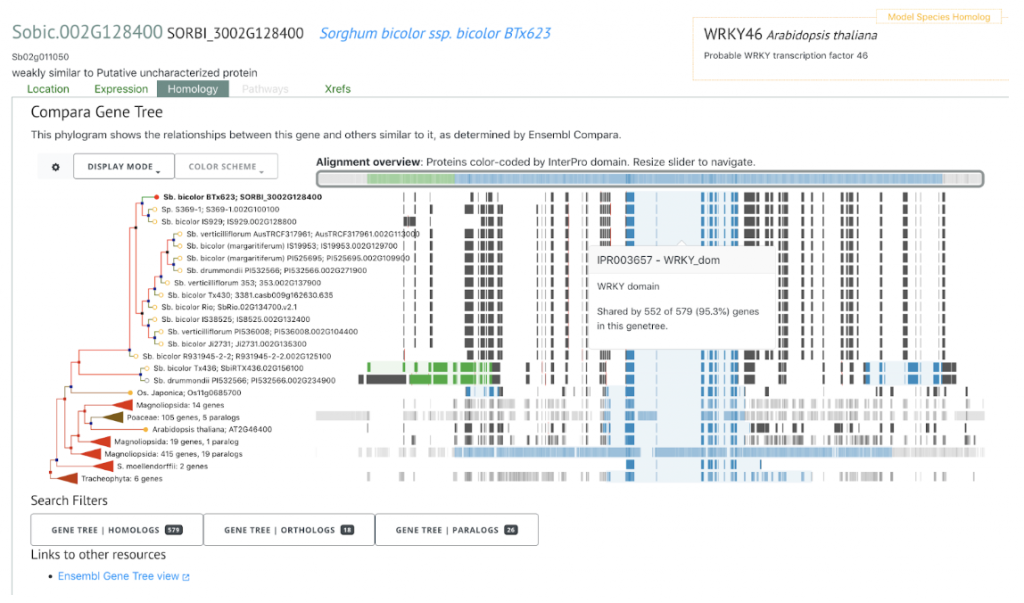Soil salinity decreases crop yield and reduces the amount of land that can be utilized for agriculture. Twenty percent of irrigated land is affected by the salt content, and it is estimated that by 2050, 50 percent of land globally will be affected (Jamil et al. 2011). Developing more salt-tolerant crop varieties will expand the area of land that is usable and help combat food insecurity. The abscisic acid (ABA) pathway is of paramount importance in abiotic stress resistance. Stresses such as drought or soil salinity trigger ABA to accumulate in plants, and ABA, in turn, regulates stress-related genes and multiple biological processes that are part of the plant’s growth and development. Transcription factors, such as ABIs (ABA Insensitive) and ABFs (ABA responsive), act as key regulators in the ABA signaling pathway (Chandrasekaran et al. 2020; Yoshida et al. 2010). ABA and related transcription factors and their relationship to salt tolerance is of great interest to scientists, breeders and growers.
A 2019 study (Varoquaux et al.) investigated 400 sorghum transcriptomes for the effects of water stress and determined that transcription factors in the WRKY transcription factor family were the most altered in sweet sorghum roots under drought conditions. In previous studies, the researchers found two sweet sorghum genotypes that reacted differently to high soil salinity – M-81E (salt-tolerant genotype) and Roma (salt-sensitive genotype). When they compared M-81E and Roma under salt stress conditions, they discovered that the WRKY transcription factor SbWRKY55 was expressed differently (Sui et al. 2015; Yang et al. 2018). In an effort to understand how plants produce and transmit salt stress signals, Song and colleagues from Shandong Normal University and the Chinese Academy of Agricultural Sciences examined the endogenic responses underlying mechanisms for WRKY55 regulation under stress tolerance. When the researchers compared M-81E and Roma in their previous research, it was clear that the expression level of WRKY55 was negatively correlated with salt and ABA treatment.
In this study, the researchers generated a transgenic sorghum line that overexpressed SbWRKY55. These overexpressing lines, in both Arabidopsis and sorghum, were highly sensitive to salt at both the seedling stage and germination. The wrky55 mutant however, had an increased tolerance of salt stress. Based on these results, the researchers hypothesize that SbWRKY55 is a salt stress responsive transcription factor and that, in sorghum, SbWRKY55 negatively regulates salt tolerance. Although the scientists were unable to generate the SbWRKY55 knockout line, they had an A. thaliana line with the AtWRKY55 gene knocked out. They “generated a complementing line of SbWRKY55 in the background of the mutants”, and found that SbWYKY55 can cover for AtWRKY55 not being functional. The overall effects of SbWRKY55 and AtWRKY55 on salt tolerance are similar, and the effects of the AtWRKY55 deletion supports similar effects on the WRKY55 deletion.
Since ABA regulates most stress response genes, the researchers exposed the sorghum to exogenous ABA and found that SbWRKY55 expression was negatively correlated with the duration of treatment. This is similar to what happens when sorghum plants are salt stressed, which supports the idea that SbWRKY55 may regulate salt tolerance in sorghum through its interaction with ABA. Analysis of the overexpressing sorghum line when compared with a wild-type sorghum line showed that ABA-GE hydrolysis gene SbBGLU22 was significantly downregulated, and that this downregulation was associated with lower level of endogenous ABA. Using yeast one-hybrid and dual-luciferase reporter assay analyses, they confirmed that SbWRKY55 can directly interact with the promoter of SbBGLU22. SbBGLU22 encodes β-glucosidase 22 in sorghum, and overexpression of Arabidopsis, rice and wheat homologs of this gene, causes increased hydrolysis of ABA-GE to ABA in vitro and in vivo; ABA signaling-mediated stress responses increase the plants’ salt stress tolerance (Lee et al. 2006; Wang et al. 2011; Xu et al. 2012). The authors postulate that SbWRKY55 could be upstream in the ABAGE pathway. SbWRKY55 directly binds to the promoter of SbBGLU22 and reduces its expression, resulting in decreased endogenous ABA and affecting salt-stress response.
The researchers further explored the role of SbWRKY55 by using the yeast two-hybrid system and the BiFC system to screen for potential SbWRKY55 interacting proteins and found that SbWRKY55 interacts strongly with SbFYVE1. Based on previous studies of this protein, the researchers hypothesize that the interaction of SbWRKY55 and SbFYVE1 may result in the inhibition of the ABA pathway. Overall, the study demonstrated that the plant’s response to salt stress is regulated through SbWRKY55’s various roles in ABA signaling.
SorghumBase example

References
Chandrasekaran U, Luo X, Zhou W, Shu K. Multifaceted Signaling Networks Mediated by Abscisic Acid Insensitive 4. Plant Commun. 2020 Mar 7;1(3):100040. PMID: 33367237. DOI: 10.1016/j.xplc.2020.100040. Read more
Jamil, S. Riaz, M. Ashraf, M. R. Foolad. Gene Expression Profiling of Plants under Salt Stress. Critical Reviews in Plant Sciences. 2011 Sep; 30:5, 435-458. DOI: 10.1080/07352689.2011.605739. Read more
Song Y, Zheng H, Sui Y, Li S, Wu F, Sun X, Sui N. SbWRKY55 regulates sorghum response to saline environment by its dual role in abscisic acid signaling. Theor Appl Genet. 2022 Aug;135(8):2609-2625. PMID: 35841419. DOI:10.1007/s00122-022-04130-y. Read more
Sui N, Yang Z, Liu M, Wang B. Identification and transcriptomic profiling of genes involved in increasing sugar content during salt stress in sweet sorghum leaves. BMC Genomics. 2015 Jul 19;16(1):534. PMID: 26186930. DOI: 10.1186/s12864-015-1760-5. Read more